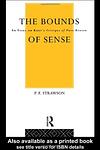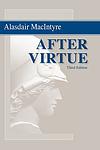Mary Warnock's top 10 philosophy books
This is one of the 291 lists we use to generate our main The Greatest Books list.
-
A Treatise of Human Nature by David Hume
This philosophical work delves into the understanding of human nature, focusing on the mind, emotions, and morality. The author argues that all of our thoughts and ideas are derived from our senses and experiences, rejecting the idea of innate ideas. He also debates the nature of causality, the existence of the self, and the basis of moral judgments. The work is a comprehensive exploration of empiricism, skepticism, and naturalism.
-
The Nicomachean Ethics by Aristotle
This philosophical work focuses on the concept of ethics, specifically virtue ethics, and how it relates to a person's character and happiness. The author argues that happiness is the highest good and the end goal of life, and that it is achieved not through pleasure, but through virtuous actions. The book also explores the nature of practical reasoning, the different kinds of virtues, the importance of friendship, and the role of luck in human welfare.
-
Individuals by P.F. Strawson
"Individuals" is a seminal work in the field of philosophy, particularly in metaphysics and the philosophy of language. The book presents a detailed analysis of the concept of individuals, the basic constituents of the world, and argues for a descriptive metaphysics that seeks to lay out the most general features of reality. The author challenges the traditional frameworks of ontology and emphasizes the importance of ordinary language and everyday concepts in understanding the structure of reality. Through rigorous argumentation, the book explores how individuals are essential to our conceptual framework and how our understanding of the world fundamentally depends on them.
-
The Bounds Of Sense by P.F. Strawson
"The Bounds of Sense" is a philosophical work that critically examines Immanuel Kant's seminal "Critique of Pure Reason." The book explores the central themes and arguments of Kant's critique, particularly focusing on his theories of knowledge, metaphysics, and the limits of human understanding. The author provides a detailed analysis of Kant's use of synthetic a priori knowledge and the conditions of possible experience, while also addressing the coherence and contradictions within Kant's system. This work not only serves as a rigorous critique of Kantian philosophy but also as a discussion on the broader implications of Kant's ideas for contemporary epistemology and metaphysics.
-
On Liberty by John Stuart Mill
This influential philosophical work explores the concept of personal freedom and societal limits, arguing that individuals should have the right to act as they want, provided they do not harm others. The book elaborates on the nature and limits of the power that can be legitimately exercised by society over the individual, and champions individuality and nonconformity. It also discusses freedom of speech, asserting that all opinions should be openly expressed to prevent any single viewpoint from becoming dogma.
-
Beast And Man by Mary Midgley
"Beast and Man" explores the blurred lines between animalistic instincts and human behavior, challenging the notion that humans are fundamentally distinct from other animals. The book delves into philosophical, psychological, and biological perspectives to argue that human nature is deeply intertwined with our animal origins. By examining traits such as aggression, cooperation, and morality, the author argues that understanding our animalistic impulses is crucial for addressing complex ethical and social issues. The work encourages a more integrated view of human identity, emphasizing that acknowledging our animal nature can lead to a more complete understanding of ourselves and enhance our ethical engagements with the world.
-
After Virtue by Alasdair MacIntyre
This book is a critique of contemporary moral philosophy, arguing that modern ethical theories have failed to provide a coherent basis for moral judgments. The author believes that the Enlightenment project of justifying morality through reason has ultimately failed, leading to a culture of emotivism where moral arguments are reduced to expressions of personal preference. The author suggests a return to Aristotelian virtue ethics, emphasizing the importance of moral character and the role of community in ethical life.
-
Sense And Sensibilia by J. L. Austin
"Sense and Sensibilia" is a philosophical work that critiques the foundations of early 20th-century empiricism and the assumptions underlying the theory of perception. The book challenges the views of philosophers who posit that our perceptions of the external world are mediated by 'sense-data,' a set of mental images or constructs that represent real objects. Through a series of detailed arguments and the examination of linguistic usage, the author argues that many philosophical problems arise from misunderstandings about the functions of language and from misusing philosophical and everyday terms. The work advocates for a more ordinary language philosophy approach, emphasizing careful analysis of language to clarify philosophical questions and dissolve problems rather than solving them in the traditional sense.
-
The Object Of Morality by G. J. Warnock
"The Object of Morality" explores the nature and foundation of moral judgments, examining whether morality is based on subjective preferences or objective truths. The author delves into the language of moral discourse, the role of intentions and consequences in ethical decision-making, and the societal and personal factors influencing moral behavior. Through a philosophical lens, the book critically assesses various ethical theories and seeks to clarify what truly constitutes the 'object' or core concern of moral considerations, aiming to provide a clearer understanding of what it means to live a morally good life.
-
The Concept Of Mind by Gilbert Ryle
This philosophical work challenges the Cartesian dualism of mind and body, proposing instead that the mind is not a separate entity but a way of acting. The author introduces the notion of "the ghost in the machine" to critique the traditional understanding of the mental as distinct from the physical. Through a detailed analysis, the text argues that mental vocabulary should be understood in terms of dispositions to behave in certain ways, rather than referring to an inner, private realm. This influential book reshapes the way we think about the mind, emphasizing that mental processes are not located in an inner space but are observable in the patterns of behavior and the competencies individuals exhibit.
Mary Warnock, 10 Books
Lady Mary Warnock is a crossbench life peer, moral philosopher and author of a number of books on philosophy, including The Intelligent Person's Guide to Ethics. This is her list of her favorite philosophy books
Added 13 days ago.
This list has a weight of 15%. To learn more about what this means please visit the Rankings page.
Here is a list of what is decreasing the importance of this list:
- Voters: 1 person voted
- List: only covers 1 specific genre
If you think this is incorrect please e-mail us at [email protected].









